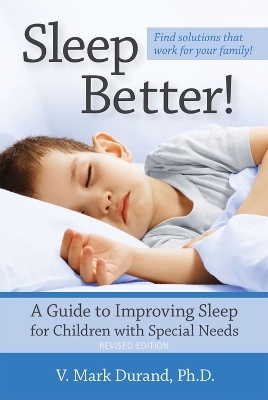
Sleep Better!
Brookes Publishing Co (Verlag)
978-1-59857-294-0 (ISBN)
- Titel nicht im Sortiment
- Artikel merken
The Better-Sleep Guide For Every Family:
Highly effective strategies for children with special needs such as autism, Tourette syndrome, and cerebral palsy
Research-based solutions to even the toughest nighttime challenges
Tested with thousands of families
Respects individual differences in families - offers different options to fit different parenting philosophies
Helps parents develop a positive outlook and attitude as they work to resolve their child’s challenges
Includes help for parents who struggle with their own nighttime problems
Flexible - parents can pick and choose strategies and modify them as needed
Valuable background information on understanding and assessing sleep problems
Practical Materials:
Sleep Diary
Self-Talk Log
Behaviour Log
Sleep Problems Scale
Plus annotated lists of additional sleep resources
Solve Sleep Issues Like:
Bedtime tantrums
Night waking
Sleep terrors
Bed wetting
Sleep schedule problems
Sleepwalking and sleep talking
Insomnia
Tooth-grinding
Periodic limb movements
V. Mark Durand, Ph.D., is known worldwide as an authority in the area of autism spectrum disorders. He is a professor of psychology at the University of South Florida St. Petersburg, where he was the founding Dean of Arts & Sciences and Vice Chancellor for Academic Affairs. Dr. Durand is a fellow of the American Psychological Association. He has received more than $4 million in federal funding since the beginning of his career to study the nature, assessment, and treatment of behaviour problems in children with autism spectrum disorders. Before moving to Florida, he served in a variety of leadership positions at the University at Albany-State University of New York (SUNY-Albany), including Associate Director for Clinical Training for the doctoral psychology programme from 1987 to 1990, Chair of the Psychology Department from 1995 to 1998, and Interim Dean of Arts and Sciences from 2001 to 2002. There he established the Center for Autism and Related Disabilities at SUNY-Albany. He received his B.A., M.A., and Ph.D. degrees - all in psychology - at Stony Brook University. Dr. Durand was awarded the University Award for Excellence in Teaching at SUNY-Albany in 1991 and in 2007 received the Chancellor's Award for Excellence in Research and Creative Scholarship at the University of South Florida St. Petersburg. Dr. Durand is currently Co-editor of the Journal of Positive Behavior Interventions, is a member of the Professional Advisory Board for the Autism Society of America, and is on the Board of Directors of the international Association of Positive Behavioral Support. He serves on a number of editorial boards, has reviewed for dozens of journals, and has more than 100 publications on functional communication, educational programming, and behaviour therapy. His books include several best-selling textbooks on abnormal psychology, Severe Behavior Problems: A Functional Communication Training Approach (Guilford Press, 1990), Sleep Better! A Guide to Improving Sleep for Children with Special Needs (Paul H. Brookes Publishing Co., 1998), and When Children Don't Sleep Well: Interventions for Pediatric Sleep Disorders, Therapist Guide (Oxford University Press, 2008). In his leisure time, he enjoys long-distance running and just completed his third marathon.
About the Reproducible Forms
About the Author
Preface to the Revised Edition
Preface to the First Edition
Acknowledgments
I. The Nature of Sleep and Its Problems
1. An Overview of Sleep
How Much Sleep Do We Need?
When Are Owls and Larks Not Birds?
What Is Sleep?
What Is Our Biological Clock?
How Does Our Temperature Affect Sleep?
Conclusion
2. Sleep Problems
How Common Are Sleep Problems?
How Serious Are These Problems?
When Does Sleep Become a Problem?
Conclusion
II. Assessing Sleep Problems
3. Identifying the Sleep Problem
Steps to Understanding the Problem
Sleep Diary
Behavior Log
Sleep Interview
Other Possible Causes
A Parent's Dilemma
Conclusion
4. Identifying Obstacles to Successful Treatment
Interfering Thoughts
Conclusion
III. Strategies for Change
5. An Optimistic Approach to Improving Sleep
Disputation
Distraction
Substitution
Conclusion
6. Good Sleep Habits
The Good Sleep Habits Checklist
Bedtime Routines
Regular Sleep Times
Caffeine
Alcohol and Tobacco
Sleep and Your Diet
Exercise, Activity, and Sleep
The Bed and the Bedroom
Conclusion
7. Help for Bedtime Problems
Graduated Extinction
Bedtime Fading
Comparing Graduated Extinction and Bedtime Fading
Combining Plans with Medication
When Sleep Problems Rear Their Ugly Heads. Again
Begin at Bedtime
Conclusion
8. Sleeping Through the Night
Causes of Night Waking
Waking without Disruption
Disruptive Night Waking
Conclusion
9. Sleeping at the Wrong Times
Delayed Sleep Phase Syndrome
Non-24 Hour Sleep-Wake Cycles
Napping and Poor Sleep Habits
Conclusion
10. Nightmares, Sleep Terrors and Other Related Problems
Nightmares
Sleep Terrors
Sleep Walking and Sleep Talking
Sleep Eating
Conclusion
11. Excessive Sleepiness
Hypersomnia
Narcolepsy
Breathing Problems
Sudden Infant Death Syndrome (SIDS)
Movement-Related Sleep Problems
Conclusion
12. Other Nighttime Difficulties
Bed-wetting
Problems with Anxiety
Problems with Depression
Sleep-Related Headaches
Nighttime Tooth-Grinding
Conclusion
13. Daytime Behavior Problems
Why Do Children Have Behavior Problems?
The Seven ""C's"" for Changing Behavior
Conclusion: A Caution About Behavior Problems
14. Sleep and Medications
Barbiturates
Benzodiazepines
Antihistamines
Other Sleep-Inducing Medications
Antidepressants
Promoting Wakefulness
Conclusion: What Do You Recommend?
15. Preventing Sleep Problems
Developmental Changes in Sleep
Prevention Strategies
Conclusion: The Beginning of Better Nights and Better Days
A. Support Groups and Associations
B. Internet Sleep Resources
C. Accredited Sleep Disorders Centers
D. Thoughts Quiz
E. Self-Talk Journal
F. Sleep Diary
G. Behavior Log
H. Albany Sleep Problems Scale (ASPS)
Index
| Verlagsort | Baltimore |
|---|---|
| Sprache | englisch |
| Maße | 160 x 227 mm |
| Gewicht | 384 g |
| Themenwelt | Sachbuch/Ratgeber ► Gesundheit / Leben / Psychologie ► Krankheiten / Heilverfahren |
| Sachbuch/Ratgeber ► Gesundheit / Leben / Psychologie ► Schwangerschaft / Geburt | |
| Kinder- / Jugendbuch ► Sachbücher | |
| Geisteswissenschaften ► Psychologie ► Biopsychologie / Neurowissenschaften | |
| Medizin / Pharmazie ► Medizinische Fachgebiete ► Neurologie | |
| Medizin / Pharmazie ► Medizinische Fachgebiete ► Pädiatrie | |
| ISBN-10 | 1-59857-294-6 / 1598572946 |
| ISBN-13 | 978-1-59857-294-0 / 9781598572940 |
| Zustand | Neuware |
| Haben Sie eine Frage zum Produkt? |
aus dem Bereich


